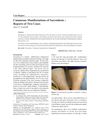 7 citations,
January 2021 in “The journal of gene medicine”
7 citations,
January 2021 in “The journal of gene medicine” Certain genetic differences may affect how likely someone is to get COVID-19 and how severe it might be.
 12 citations,
February 2001 in “Annals of Pharmacotherapy”
12 citations,
February 2001 in “Annals of Pharmacotherapy” No effective treatment for hair loss after childbirth was found, but it usually gets better on its own and some cosmetic methods might help.
 1 citations,
April 2021 in “International Journal of Dermatology”
1 citations,
April 2021 in “International Journal of Dermatology” Women with conditions like PCOS may have a higher risk of COVID-19, but treatments like isotretinoin could help those with acne.
 1 citations,
September 2020 in “Journal of the Endocrine Society”
1 citations,
September 2020 in “Journal of the Endocrine Society” Men have worse COVID-19 outcomes than women due to genetic and hormonal differences.
 June 2023 in “British journal of dermatology/British journal of dermatology, Supplement”
June 2023 in “British journal of dermatology/British journal of dermatology, Supplement” A woman's rare hair loss condition improved on its own, suggesting this type might recover like common cases.
 April 2016 in “Journal of The American Academy of Dermatology”
April 2016 in “Journal of The American Academy of Dermatology” Finasteride and SSRIs together increase impotence and low libido risk in men.
 18 citations,
April 2021 in “Experimental Dermatology”
18 citations,
April 2021 in “Experimental Dermatology” COVID-19 may cause hair loss and scalp pain due to inflammation and changes in hair follicle receptors, but these symptoms typically resolve in 2 to 4 months.
 4 citations,
May 2021 in “Journal of The European Academy of Dermatology and Venereology”
4 citations,
May 2021 in “Journal of The European Academy of Dermatology and Venereology” Hair loss doesn't affect COVID-19 severity.
 2 citations,
March 2015 in “Clinical and Experimental Dermatology”
2 citations,
March 2015 in “Clinical and Experimental Dermatology” Azathioprine can cause unusual hair loss, which may reverse after stopping the drug.
 November 2022 in “The Indian journal of chest diseases & allied sciences”
November 2022 in “The Indian journal of chest diseases & allied sciences” Isoniazid can rarely cause hair loss, which is reversible after stopping the drug.
 March 2017 in “BIRDEM Medical Journal”
March 2017 in “BIRDEM Medical Journal” Sarcoidosis can cause various skin issues, making diagnosis difficult.
 21 citations,
January 2021 in “Journal of infection and chemotherapy”
21 citations,
January 2021 in “Journal of infection and chemotherapy” Men, diabetes, and high inflammation levels lead to higher COVID-19 antibodies.
 12 citations,
March 2017 in “Journal of obstetrics and gynaecology Canada”
12 citations,
March 2017 in “Journal of obstetrics and gynaecology Canada” Testosterone therapy can modestly improve sexual function in menopausal women but should be used cautiously and is not recommended for routine measurement in sexual dysfunction or hirsutism.
 4 citations,
July 2013 in “Journal of dermatology”
4 citations,
July 2013 in “Journal of dermatology” Malnutrition can cause unusual eyelash growth and hair loss.
 37 citations,
March 2014 in “Journal of Trace Elements in Medicine and Biology”
37 citations,
March 2014 in “Journal of Trace Elements in Medicine and Biology” Lower hair zinc and copper levels found in Turkish males with hair loss; higher BMI linked to less hair zinc.
 30 citations,
November 2009 in “British Journal of Dermatology”
30 citations,
November 2009 in “British Journal of Dermatology” Higher aldosterone levels link to hair loss and high blood pressure.
 20 citations,
July 1990 in “Journal of the American Academy of Dermatology”
20 citations,
July 1990 in “Journal of the American Academy of Dermatology” Captopril may cause hair loss, as shown by a woman's hair regrowing after stopping the medication.
 11 citations,
April 2009 in “Pharmacotherapy”
11 citations,
April 2009 in “Pharmacotherapy” Minoxidil can cause deadly skin reaction; monitor patients closely.
 10 citations,
February 2009 in “European urology. Supplement”
10 citations,
February 2009 in “European urology. Supplement” Treatment for benign prostatic hyperplasia involves drugs that either quickly relieve symptoms or reduce prostate size, with a combination offering more benefits but more side effects.
 8 citations,
October 2016 in “Actas Dermo-Sifiliográficas”
8 citations,
October 2016 in “Actas Dermo-Sifiliográficas” FFA in men, often mistaken for other hair loss types, may be more common than thought and needs larger studies for confirmation.
 6 citations,
May 2011 in “Journal of Pharmacy Technology”
6 citations,
May 2011 in “Journal of Pharmacy Technology” Old drugs can be used for new treatments, saving time and money, but there are challenges like needing more evidence and legal concerns.
 6 citations,
April 2004 in “Dermatologic Surgery”
6 citations,
April 2004 in “Dermatologic Surgery” Finasteride showed limited hair growth and low patient compliance in treating male pattern baldness.
 5 citations,
April 2013 in “Current Problems in Pediatric and Adolescent Health Care”
5 citations,
April 2013 in “Current Problems in Pediatric and Adolescent Health Care” The document concludes that early and personalized treatment for PCOS in adolescents is crucial to manage symptoms and prevent long-term health issues.
 5 citations,
March 2011 in “Journal of pediatric health care”
5 citations,
March 2011 in “Journal of pediatric health care” The girl with autoimmune hair loss might regrow hair within a year, and treatments can help but not prevent recurrence; dermatologist referral and corticosteroids are recommended.
 1 citations,
February 1993 in “Nursing Standard”
1 citations,
February 1993 in “Nursing Standard” Many drugs, not just chemotherapy, can cause reversible hair loss.
 January 2024 in “Hypertension research”
January 2024 in “Hypertension research” More research is needed to understand sex and racial differences in long COVID.

COVID-19 may lead to severe skin necrosis without clear underlying causes, as seen in a diabetic patient who required leg amputation.
 April 2019 in “Advances in Cosmetic Surgery”
April 2019 in “Advances in Cosmetic Surgery” The document concludes that ongoing medical therapy is crucial for preventing hair loss, and surgical options can restore hair, with future treatments for hair loss being promising.
 December 2016 in “British Journal of Dermatology”
December 2016 in “British Journal of Dermatology” The meeting highlighted the importance of genetic testing and multidisciplinary approaches in pediatric dermatology.
 December 2011 in “The Diabetes Educator”
December 2011 in “The Diabetes Educator” The Blood Glucose Management Service improved patient safety and outcomes in managing blood sugar in hospitalized patients.






























